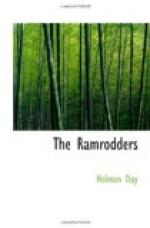THE MANTLE OF THELISMER THORNTON
The fire on the Jo Quacca hills was checked at nightfall. Two hundred beaters and trenchers managed to fight it back and hold it in leash to feed on the slash of the timber operation. But, like a tiger confined in its cage, it had reached out through its bars and claimed victims. Three stands of farm buildings were in ruins.
Harlan Thornton, sooty and weary, left the fire-line as soon as he knew that the monster had been subdued. He rode about to reassure the owners that their losses would be made up by himself and his grandfather.
“Keep away from the lawyers,” he counselled the losers. “They’ll get half the money out of you if you hire them. We’ll settle after appraisal.”
The men that he talked to seemed sullen in spite of his assurances. They seemed to be repressing taunts or reproaches merely in consideration of the fact that he was holding the purse-strings. He noted this demeanor, and feared to ask questions.
Clare Kavanagh rode with him; she had not left his side, even when he led his crews into perilous places and entreated her to keep back.
And they rode away together down the long stretch of highway from the hills to the village. Behind them, against the dusk, glowed the red, last signals of the dying fires: tree-trunks upraised like smouldering torches, the timbers of the falling buildings tumbling from their props and sending up showers of sparks. A pale sliver of new moon made the red of the fires even more baleful, and the two who rode together looked back and felt the obsession of something they had never experienced before.
“I am unhappy, Big Boy,” sighed the girl. “We have never come back from our rides like this.”
“It has been a wicked day for both of us, child.”
“And you cannot call me child after to-day—so my father says.” Her voice was still plaintive, but there was a hint of the old mischief there. “I’ll be sixteen to-morrow—and I didn’t know until to-day that I’d be so sorry that it is so. Ever since I was ten I’ve been wishing I could be eighteen without waiting for the years. But I don’t know, now, Harlan. It seemed as though I’d be getting more out of living. I thought so.” Tears were in her voice now. “It seems as though I’d grown up all of a sudden; and things aren’t beautiful and happy and—and as they used to be—not any more! I’ve lost something, Harlan. And if growing up is losing so much, I don’t want to grow up.”
He listened indulgently and understood this protest of the child. Their horses walked slowly side by side, and the tired hounds trailed after them.
“The grown-ups do lose a lot of things out of life, little girl—things that mean a great deal in childhood. But keep your heart open, and other things will come.”
“Perhaps when I get to be twenty-four years old and as big as you are I can talk that way, and believe it, too. But just now I’m only a girl that doesn’t believe she’s grown up, even if they do tell her so, and tell her she mustn’t be a playmate any longer. And you are not to ride with me any more, and you are not to come to my house nor may I come to yours. That’s what they say. What are we to do, then?”




